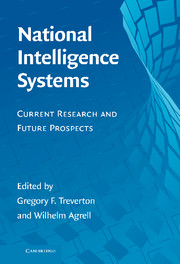Book contents
- Frontmatter
- Contents
- Preface
- 1 Introduction
- PART 1 DEFINING THE FIELD, ITS THEORY, HISTORIOGRAPHY, AND CHANGES AFTER THE COLD WAR
- PART 2 RESEARCH ON NEW CHALLENGES, METHODS, AND THREATS
- 6 On Counterterrorism and Intelligence
- 7 Technical Collection in the Post–September 11 World
- PART 3 INTELLIGENCE, POLITICS, AND OVERSIGHT
- Index
- References
6 - On Counterterrorism and Intelligence
from PART 2 - RESEARCH ON NEW CHALLENGES, METHODS, AND THREATS
Published online by Cambridge University Press: 05 June 2012
- Frontmatter
- Contents
- Preface
- 1 Introduction
- PART 1 DEFINING THE FIELD, ITS THEORY, HISTORIOGRAPHY, AND CHANGES AFTER THE COLD WAR
- PART 2 RESEARCH ON NEW CHALLENGES, METHODS, AND THREATS
- 6 On Counterterrorism and Intelligence
- 7 Technical Collection in the Post–September 11 World
- PART 3 INTELLIGENCE, POLITICS, AND OVERSIGHT
- Index
- References
Summary
Counterterrorism is an intelligence war. The intelligence community (IC) plays a central role in counterterrorism in at least three key ways. Counterterrorism relies on intelligence to (1) understand the threat, (2) give warning of adversaries' intentions and capabilities, and (3) find and disrupt the adversary. In these roles, intelligence provides counterterrorism forces with targets and opportunities to attack terrorist capabilities and processes, thereby achieving strategic objectives.
Measuring the effectiveness of counterterrorism strategy is critical to the success of the strategy in order to validate the strategy and consequent resource decisions, to ensure the effectiveness of the plans and underlying action, and to provide policy makers with insight into whether counterterrorism efforts are actually making a difference. Here, the IC plays a fourth key role, in collecting, processing, and analyzing data required to assess effectiveness and providing planners with information necessary to establish “metrics” and measure strategic effectiveness. There are models of assessment that provide ways to measure strategic effectiveness that also provide insight into what is needed from intelligence.
The nature of the terrorist threat, the demands of effective counterterrorism strategy, the role of intelligence in counterterrorism, and the need to measure strategic effectiveness all generate new requirements for intelligence. Research on intelligence tradecraft, tools, process, and policy can provide intelligence agencies with ways to transform their business and better fulfill their counterterrorism roles.
- Type
- Chapter
- Information
- National Intelligence SystemsCurrent Research and Future Prospects, pp. 117 - 146Publisher: Cambridge University PressPrint publication year: 2009
References
- 3
- Cited by

